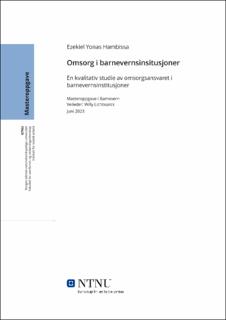| dc.contributor.advisor | Licthwarck Willy | |
| dc.contributor.author | Hambissa Ezekiel Yonas | |
| dc.date.accessioned | 2023-09-29T17:23:22Z | |
| dc.date.available | 2023-09-29T17:23:22Z | |
| dc.date.issued | 2023 | |
| dc.identifier | no.ntnu:inspera:138896764:93487176 | |
| dc.identifier.uri | https://hdl.handle.net/11250/3093244 | |
| dc.description.abstract | Barnevernsinstitusjonene i Norge har et viktig samfunnsmandat. Ifølge loven skal de ivareta og gi nødvendig omsorg og beskyttelse til barn og unge. Målet er å møte barna og unge med forsvarlig omsorg, og dette utgjør grunnlaget for barnevernsinstitusjonenes arbeid. Det er forskjellige grunner til at barn og unge blir plassert på institusjonene. Det kan være på grunn av omsorgssvikt fra deres omsorgspersoner, men det kan også være på grunn av atferds utfordringer som krever mer omfattende intervensjon. I denne konteksten er miljøterapeutene de sentrale aktørene som møter ungdommene på institusjonen.
Miljøterapeutene blir tildelt rollen som omsorgsgivere for barna. Deres oppgave er å sikre at barn og unge får den nødvendige omsorgen og beskyttelsen de trenger. De har et betydningsfullt omsorgsansvar overfor barn og unge som er i barnevernsinstitusjonene. Det er nettopp dette omsorgsansvaret jeg ønsker å belyse. For å utforske hvordan miljøterapeutene forstår sitt omsorgsansvar i møte med barn og unge på barnevernsinstitusjonene, gjennomførte jeg fokusgruppeintervjuer. Med tanke på betydningen omsorgsansvaret for praksisen.
Jeg var spesielt interessert i å undersøke om det var ulike forståelser av omsorg blant miljøterapeutene basert på hvilken type institusjon de tilhørte. Miljøterapeutene jeg intervjuet arbeidet ved både omsorgsinstitusjoner og behandlingsinstitusjoner. Dermed forsøker jeg å beskrive om miljøterapeutene har ulike forståelser av omsorgsansvaret på bakgrunn av, institusjonstype de tilhører. Enkelt forklart prøver jeg belyse om institusjonssystemet i Norge påvirker miljøterapeuters dannelse av omsorgsforståelse. | |
| dc.description.abstract | The Norwegian child welfare institutions have an important societal mandate. According to the law, they are responsible for ensuring and providing necessary care and protection to children and youth. The goal is to meet these individuals with proper care, and this forms the foundation of the work carried out by child welfare institutions. There are various reasons why children and youth are placed in these institutions, either due to neglect by their primary caregivers or behavioral challenges that require more comprehensive intervention. In this context, social workers play a central role in their interaction with the youth in these institutions.
Social workers are assigned the role of caregivers for the children. Their task is to ensure that children and youth receive the necessary care and protection they need. They have a significant responsibility for the care of children and youth in the child welfare institutions. It is precisely this responsibility of care that I aim to elucidate. To explore how social workers understand their responsibility of care when engaging with children and youth in child welfare institutions, I conducted focus group interviews. Because the understanding of their responsibility of care has implications for their practice.
I was particularly interested in investigating whether there were different understandings of care among social workers based on the type of institution they worked in. The social workers I interviewed worked in both care institutions and treatment institutions. Therefore, I sought to describe whether there were different understandings of the responsibility of care among social workers depending on the type of institution they belonged to. In other words, I aimed to examine whether the institutional system in Norway influenced the formation of care understandings among social workers. | |
| dc.language | nob | |
| dc.publisher | NTNU | |
| dc.title | Omsorg i barnevernsinstitusjoner | |
| dc.type | Master thesis | |
